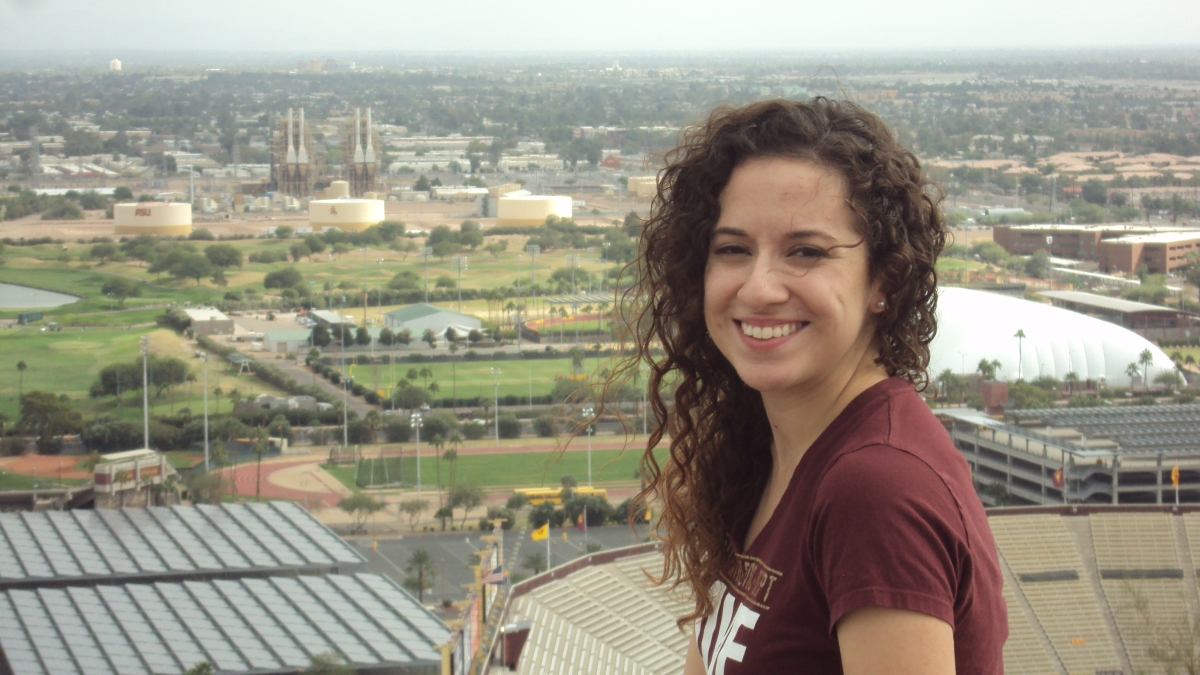ASU student learns how to give justice to the hungry

Alexa Kirkpatrick is working on her masters in justice studies in the School of Social Transformation.
The word “justice” evokes thoughts of courtrooms, police officers, lawyers and judges for most people. But Arizona State University student Alexa Kirkpatrick thinks of justice more often in terms of food.
“I’ve always been really interested in the culture of food. I think it’s a very fascinating and a very relevant subject that affects everyone,” she said. “Aside from the fact that you literally need food to survive, there’s something really important to the ways we preserve food or withhold food from certain people without realizing it.”
In 2013, Kirkpatrick received a Bachelor of Interdisciplinary Studies with a focus on justice studies and chemistry from ASU. After a couple years in the workforce, she decided to pursue a master’s degree in justice studies with an emphasis on “food justice” from the School of Social Transformation in the College of Liberal Arts and Sciences.
When Kirkpatrick decided to attend graduate school, she had a daughter and was working full-time. She said striking a balance between work, school and family is difficult. But, as a lover of food, she still finds time to learn new recipes and pursue her research interests.
Part of Kirkpatrick’s focus in graduate school is the institutional barriers underprivileged communities face in securing access to enough food. She said she’s also fascinated by the culture of food and its importance to communities. These two interests combine in an environment in which she said the primary goal of many of the students is to find a way to help.
“It’s hard not to be increasingly sympathetic to people who don’t have food. And it’s people who you may share classes with and you don’t realize. And that’s something really important for people in the School of Social Transformation. People here really care about other people. There’s a strong humanitarian tie to whatever we’re studying. Just because I might be able to afford food one week, doesn’t mean I should stop fighting for people who can’t.”
Kirkpatrick also said there are many misconceptions about land development, which directly contributes to the scarcity of food for certain people. She said one of these is the view that development and progress happen through urbanization; that is, the conversion of farmland to urban land.
She also said it’s necessary to question whether development and progress equal prosperity for any given community. The communities in question often can’t speak for themselves because they lack the influence to do so.
“People have these needs every day, all around the state and around the nation,” she said. “Giving a voice to people who find it difficult to speak for themselves is probably one of the most important things that I’m trying to pursue.”
Kirkpatrick said she’s been most appreciative of ASU’s resources. The School of Social Transformation has helped her get in touch with the right people in order to be successful. Specifically, for her upcoming master’s project, Kirkpatrick needs to find a project committee, which will oversee its progress. She said her professors have helped her get in touch with people to be on the committee.
“I really have enjoyed the networking possibilities that are made available specifically because of ASU,” she said. “If you need help or if you need resources, someone is there whether or not it’s the person that you initially go to. They can help you connect with other people. It’s like a huge web, a huge network of people who are dedicated to a really similar goal.”
In the meantime, Kirkpatrick doesn’t know exactly what her future looks like post-graduation. She said she’s planning to work in community engagement, with the intention of facilitating programs to make food more readily available to underprivileged communities. She said she might return to ASU for a doctorate in the future.
“I don’t exactly know what kind of career I might go into, but the pursuit of knowledge has been the most worth-it cause I’ve ever pursued,” she said.
More Arts, humanities and education

ASU English professor directs new Native play 'Antíkoni'
Over the last three years, Madeline Sayet toured the United States to tell her story in the autobiographical solo-…

ASU student finds connection to his family's history in dance archives
First-year graduate student Garrett Keeto was visiting the Cross-Cultural Dance Resources Collections at Arizona State University…

ASU alumna makes her way back to the ASU Gammage stage for '¡azúcar!'
As the Los Angeles-based CONTRA-TIEMPO dance group prepares for its upcoming production “¡azúcar!” at ASU Gammage, for one member…